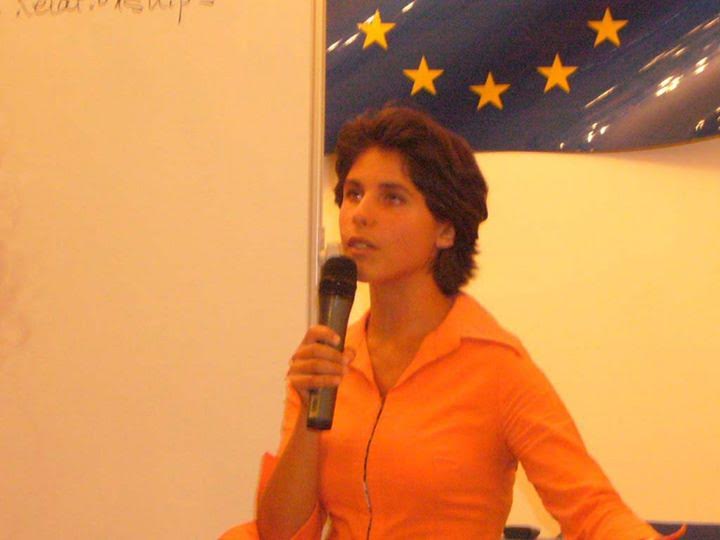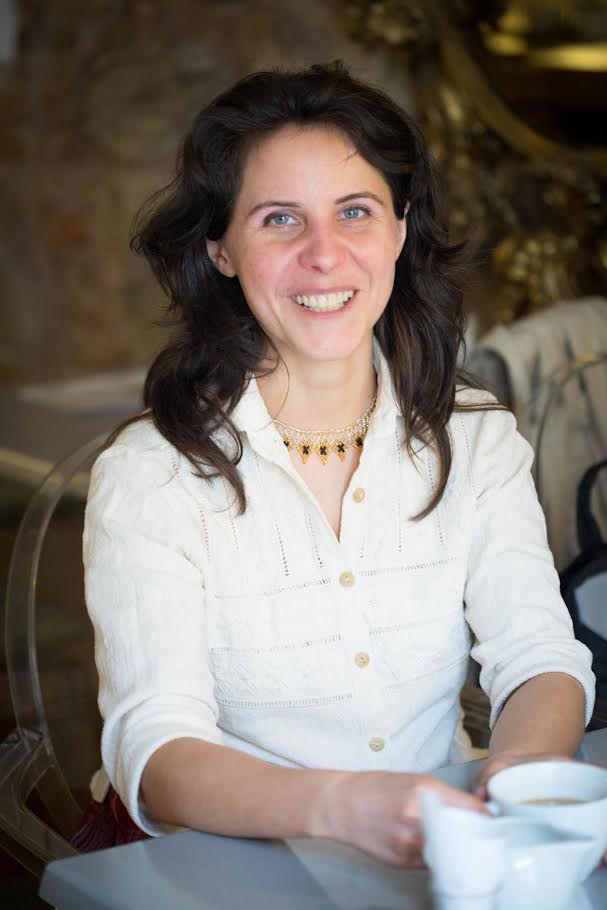Croats Living in Croatia, Earning Abroad: Kosjenka Muk near Karlovac
January 12, 2023 - The Croatian dream - to live in Croatia and get income from abroad. Meet the locals who are living that dream, and find out how you could, too, in a new TCN series. In the latest in the series, meet Kosjenka Muk, who is enjoying life in Istria.
Croatia, great for a 2-week holiday, but a nightmare for full-time living unless you are very rich, so the perceived wisdom goes. The Croatian dream is to live in Croatia with a nice income from abroad, as many foreigners and remote workers do. For Croatians, if I read the comments in my recent video, Croatia is the Best Place to Live: 8 Reasons Why (see below), salaries are too low and people are forced to emigrate in search of a better life.
While there is definitely an element of truth to this, it got me thinking. The era of remote work is here, and the workplace is increasingly global, with a labour shortage for many skills. It doesn't matter if you are from Boston or Bangladesh if you have the skills, desire, and work ethic, and are able to work remotely online. And while it is certainly true that salaries in Croatia are low, what about the opportunities that the global online marketplace offers? If foreigners can find ways to live in Paradise and work remotely, why not locals? Curious, I posted this on my Facebook and LinkedIn:
Do I know many Croats who are living in Croatia, but working remotely for international companies who would be interested in being part of a TCN interview series showcasing living in Croatia but earning online, including advice to others on how to get started? It could be an interesting series. If interested, contact me on This email address is being protected from spambots. You need JavaScript enabled to view it. Subject Remote Croatia.
Some 15 emails - and several inspiring stories - later, and I think we have the makings of what could be a rather interesting series, Croats Living in Croatia & Earning Abroad. Next up in the series, Kosjenka Muk near Karlovac.
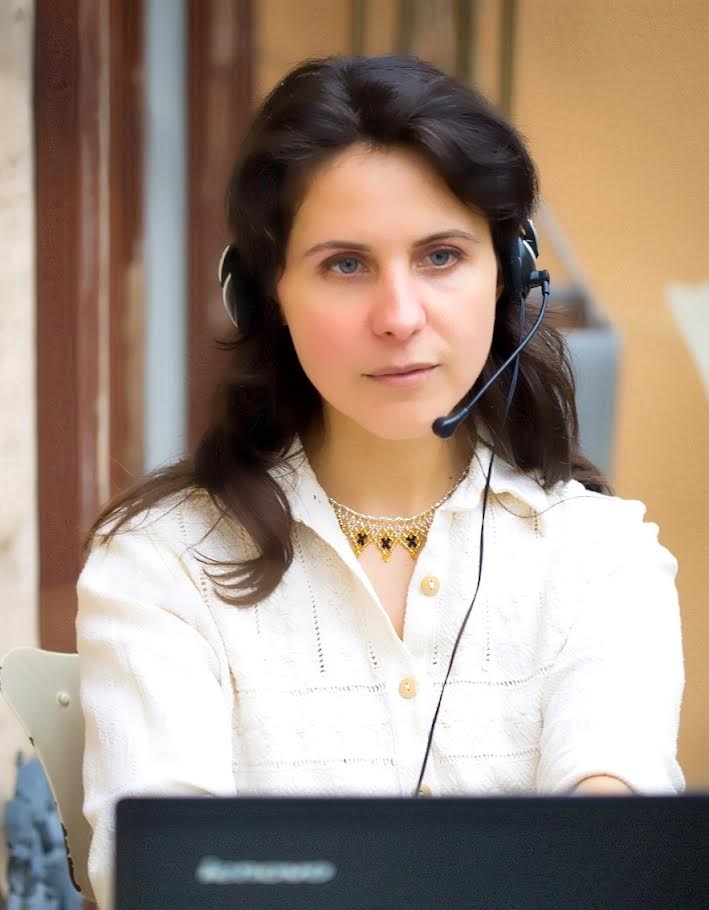
My name is Kosjenka Muk, and I work as a coach for emotional and relationship issues. I grew up in central Istria and now live close to Karlovac, working mostly online while enjoying gardening and traveling in my free time.
My passion for psychology started around the age of 15 when I found some books about positive thinking and self-esteem in my local library. From my adult perspective, those books now seem oversimplified and superficial, but at that time, they gave me a breakthrough change of perspective. They helped me turn my adolescent depression around and made me realize that many of my uncomfortable emotions and beliefs were not the reality – and could change. I remember thinking, "How is it possible that nobody around me knows anything about this? How much would the world change if more people knew about this!” Of course, I was way too idealistic and inexperienced at the time, but from then on, my path in life was clear to me.
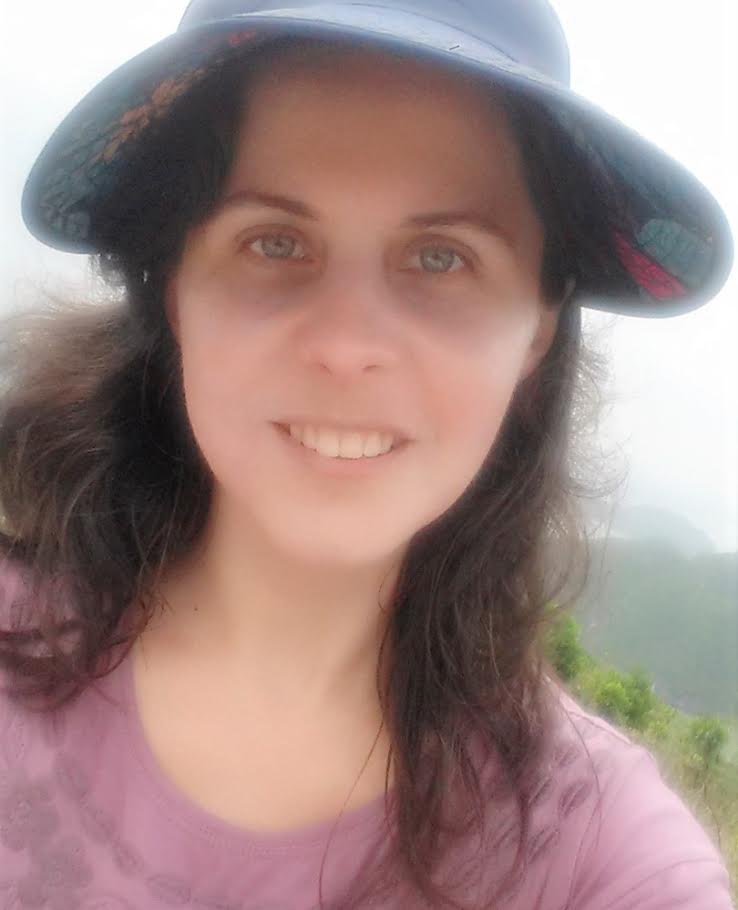
I decided to study what was then called "social pedagogy” rather than psychology, after being told that the study of psychology in Croatia is much more theoretical than practical. But where I truly found myself was in an extracurricular method of coaching called Integrative Systemic Coaching.
After some years of practice in Croatia only, I slowly moved on to online work in both Croatian and English. Now my clients are partly from Croatia, and partly from all over the world. Online work enables me not only to reach more people, but to live in the countryside rather than in a city, which I prefer as a nature lover and a bit of a farmer at heart. The Internet made it possible for me to achieve most of my dreams, and I keep thinking how lucky I am to live at this time in history, even with all its problems.
1. Many Croats are emigrating but you not only chose to stay, but managed to achieve the Croatian dream - living here and working for an international company. Tell us how you did it.
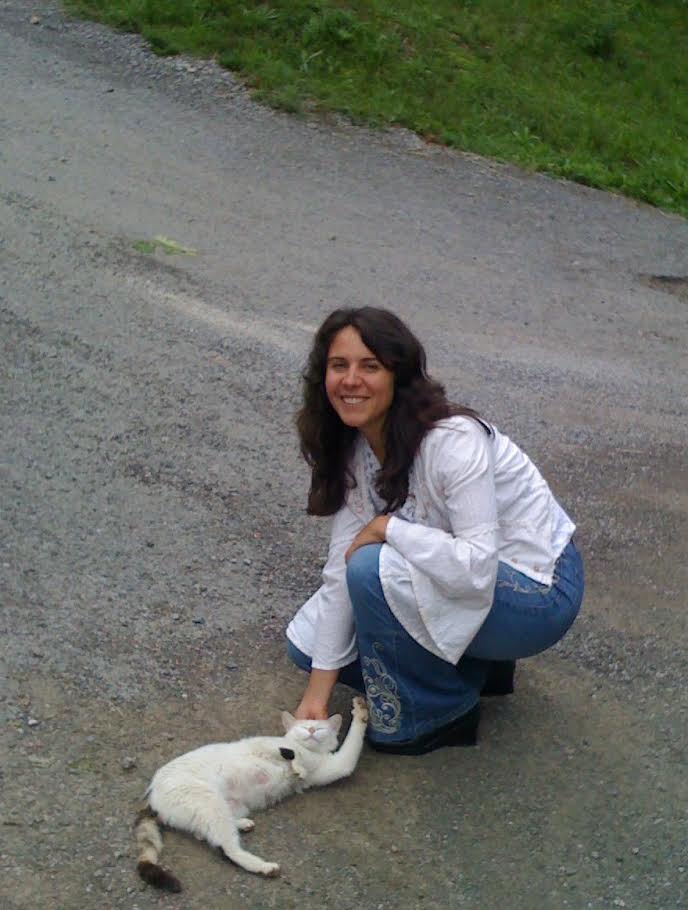
I'm actually self-employed rather than working for a company. It was quite a rough ride at first. I started in 2004, when the Internet was still relatively young in Croatia (but developing quickly), not many people even had an e-mail address yet, there was no tradition of coaching or voluntarily going to therapy, the market was small but the competition already fairly strong.
The first 2 years were bare survival. I tried various ways to promote my work, some rather expensive but none successful. I had no money to pay for web design, so I learned basic HTML to create a simple website myself. Then I started writing articles, which at first I sent to my friends' emails. Many people forwarded my articles around, which prompted new people to ask for them, and so my mailing list and practice grew. I also started giving regular public talks, often in libraries.
I'm a rather shy introvert, so all of that was quite scary for me, but my drive was stronger. Not to mention that I should live what I preach, right? After a while, I got an offer from a small publishing company to publish my articles as a book, which I eventually decided to publish myself. I also got an offer from a friend to make some CDs with guided exercises, which we did, but they didn't sell well.
Things were going well for a few years, and then the 2008 recession struck. Within a few months, I lost 80% of my income. Survival mode again! Luckily, my (now late) first partner, who was also my business partner at the time, was there to help. Together, we decided to include online coaching into our work. That was also tough at first, but slowly grew. I published my second book and decided to translate the first one into English and put it on Amazon. While researching Amazon publishing, I noticed that many people prefer short books they can read quickly, so I also wrote and published several short "workbooks”. Those don't bring much income, but are a source of credibility. I even recently met my new partner through them, so they obviously weren't a waste of time.
2. Looking for jobs based in Croatia can be a challenging task. How challenging was it for you to get where you are today - it must have taken a lot of determination and rejection.
My only experience of working for someone else was 2 years of part time work in a social service project in Istria, which was a part of the then government program called "S faksa na posao” ("From study to work”), which was meant to give graduate students some work experience so they would be more employable. After that, I got an offer for a full-time job in a local school, but I also wanted to start my own practice, which was a tough decision, especially for my parents' peace of mind. But I knew what I wanted, and I never looked back. The rest is history which you already know.
3. If you can do it, presumably others can too. Are you aware of others who have had similar success, but maybe in different industries?
I know of a few people in my own "trade”, as well as of quite a few IT experts, a couple of translators, a graphic designer, and a woman who promotes Croatian tourism and has published several successful books of Croatian recipes. The more the Internet and related industries grow, and especially with the recent jump in popularity of home office and online work, creative and persistent people have more opportunities than ever before.
4. What is the general feeling among people in Croatia today. Is it possible to have a good life here, or is the grass greener on the other side?
We all know the grass is always greener on the other side. But of course it's often more a matter of perception than reality. For some people, it might be easier to succeed in the West rather than Croatia, but it's also much easier to succeed from Croatia than from many other places in the world, especially nowadays. Living in rich countries also has its downsides, as foreigners who choose to live in Croatia well know.
My impression is that young people are moving further and further away from the socialist mindset of relying on somebody else for employment, although the older generations still often have discouraging views on entrepreneurship. Many people have moved out, many people (rightfully) complain, but I hope as time goes by, Croatia will be an increasingly attractive place to live.
5. Apart from corruption and nepotism, low wages are often cited as a reason to emigrate. But with the remote work revolution, as your example has shown, as well as the influx of many foreign workers to the likes of Rimac and Infobip for example, show that a good quality of life IS possible in Croatia. What are your thoughts on that?
Personally, I never had any particular "connections” to pull, nor did I ever consider finding some or bribing anybody, although I'm well aware that many local people get through life that way and sometimes don't seem to have a choice. There are some objective obstacles and difficulties to succeeding in Croatia, slow bureaucracy and high taxes, for example, on top of what you already mentioned. Still I would say that the biggest obstacles are in one's head. I hope with time more and more Croatian people will learn to think in terms of "Why not?” and to see difficulties as challenges, rather than the reasons to not try. Modern times give us so many opportunities. And hopefully we can collectively smarten up and start working on removing the obstacles, as well.
I must add I'm glad I'm only responsible for my own salary, though. Having employees would be much more difficult.
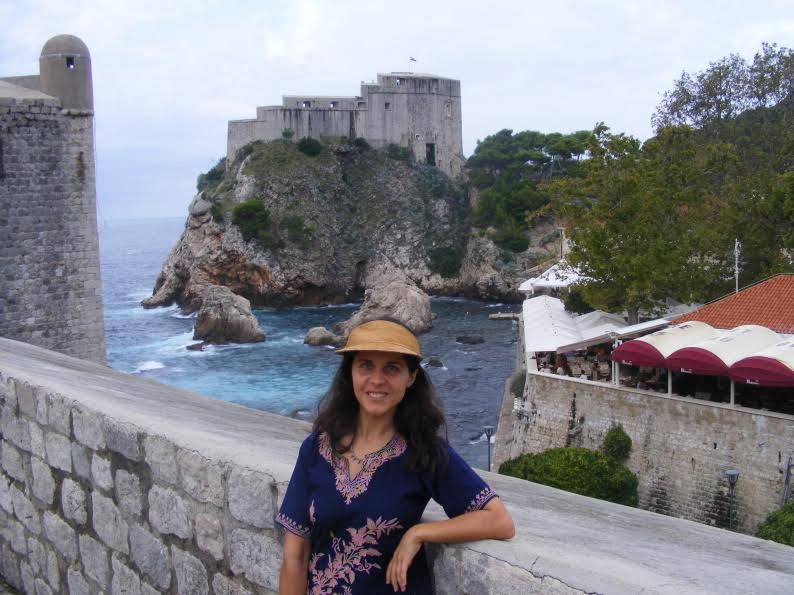
6. What advice do you have for others who would like to stay in Croatia, but have no idea where or how to find a possible remote work job or business as you have managed to do?
Your head is where you start. Be willing to take (reasonable) risks and get out of your comfort zone. Be willing to learn, including learning things beyond your primary area of interest. Expect some struggle in the early years and be patient, don't expect too much too soon. Develop your creativity and brainstorm ideas. More important than anything, think of mistakes and failures as the fastest way to learn, rather than proof you can't make it.
7. Three reasons you decided to stay in Croatia, and the one thing you would like to change in this country.
1) Balance. The work-life balance, the balance between industry and nature, even between rules and freedom (although the latter sometimes brings some headaches). I like that Croatia is not overpopulated, and most people still don't measure others by how much they earn, even if the introduction of wild capitalism in the 90s made things worse in this context.
2) Nature. I took Croatia for granted when I was a kid, and preferred long-distance travel at first, but the more experience I have, the more I realize how much beauty we have in a relatively small area.
3) Prices of real estate, especially of land if you want a garden, especially if you don't feel you must live at the coast or in Zagreb.
4) (optional) To not feel treated like an immigrant and a second-grade citizen, although as a taxpayer in Croatia, I have certain doubts about evading the latter.
What I would most like to change is the attitude to voting in Croatia. Not only to coming out to vote at all, but also voting along party lines, tribal lines, inertia lines, or even corruption lines. Only when we change that, can we truly start solving the other problems.
Contacts:
You can learn more about Kosjenka Muk via her website and Facebook.
****
Thanks Kosjenka, very inspiring, and congratulations on all your success.
You can follow the rest of this series in the dedicated TCN section here.
If you would like to contribute your story to this series, please contact This email address is being protected from spambots. You need JavaScript enabled to view it. Subject Remote Croatia.
****
What is it like to live in Croatia? An expat for 20 years, you can follow my series, 20 Ways Croatia Changed Me in 20 Years, starting at the beginning - Business and Dalmatia.
Follow Paul Bradbury on LinkedIn.
Subscribe to the Paul Bradbury Croatia & Balkan Expert YouTube channel.
Croatia, a Survival Kit for Foreigners is now available on Amazon in paperback and on Kindle.

Injured Turtle in Korčula Bay: Rescued, Treated, Ready For New Life
July 17, 2021 - An injured turtle in Korčula Bay sparked immediate action by locals and vets, seeing the turtle being saved and getting a second chance.
Like many other places, towns, locations, and neighborhoods, Korčula also has groups on social media to ease communication among users who share the same place of daily life. Friday afternoon saw residents of Korčula have a big heart, and despite might being stereotypically perceived as laid back, chilled chaps (as for every Mediterranian-culture impacted people), they were quick to act when needed.
A user under the name Antoni Ja, one of the members of the FB group Oglasnik otoka Korčule (Korčula Island Message Board), reported on a 20 kilo turtle floating in the sea in Žrnovska Banja. Floating, the keyword.
„Please do something, so it doesn't get hit by a speedboat or some maniac“, said Antoni Ja.
Other users immediately started to worry if the turtle was injured, and the name of a local vet Vilović was suggested as an address to report the issue.
Sure enough, Vilović examined the turtle, and the 20-kilo turtle turned out to be over 50 kilos. Not quite often seen in shallow waters, but nevertheless a normal turtle size in the Adriatic sea.
„It had a head wound, most likely from the propeller. It is on its way to the Specialist in Split by catamaran“, briefly commented Vilović.
Indeed, as the photo on the FB group published by Ana Jurić shows, the turtle was on its way to Split.
„Kudos to the vet and the guys that organized all this, and the turtle is huge!“ wrote Jurić.
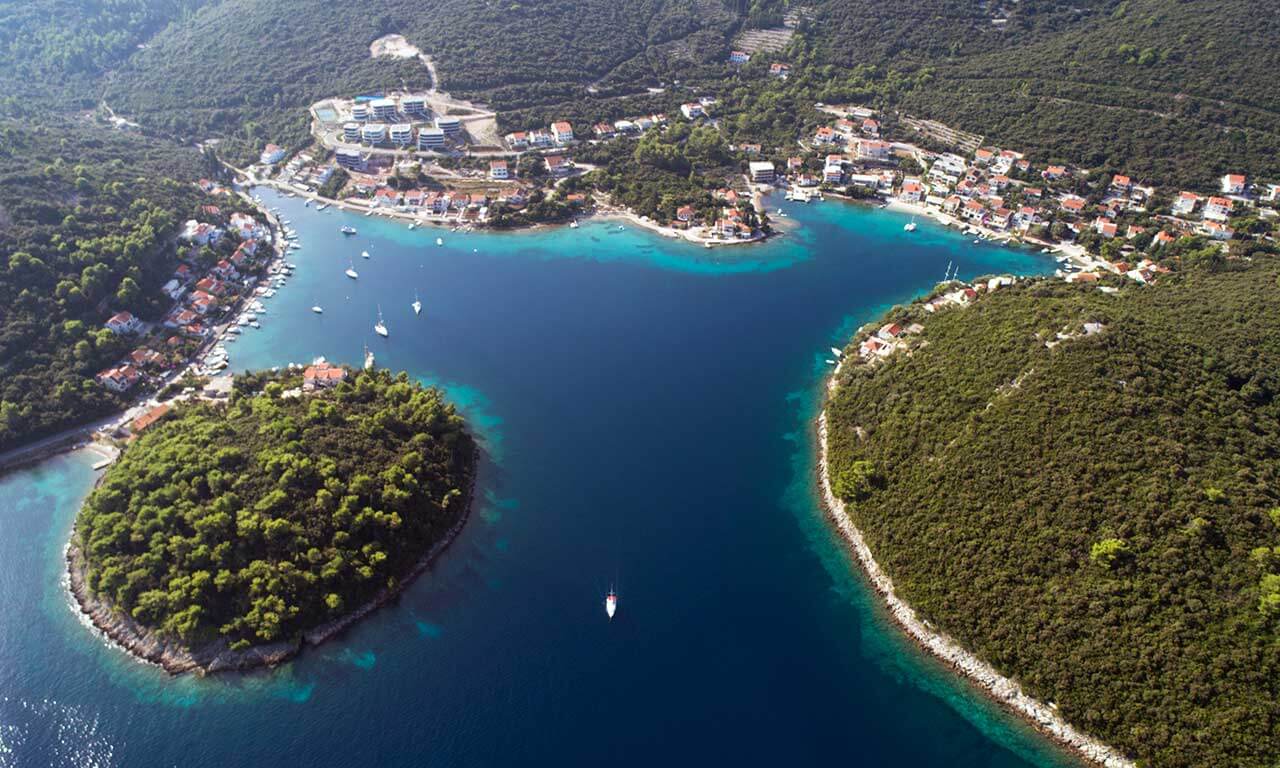
Zrnovska Banja where the turtle was spotted floating © Visit Korcula
Dr. Mario Gavranović, head of the VET VISION clinic in Split, confirmed that the turtle arrived on Friday night. „It should arrive in an hour or two. The propeller injury is an old wound and I will first have to examine it to see what is the proper way of treatment“, said Dr. Gavranović.
When contacted on Saturday morning to provide more information on what happened to the turtle, dr. Gavranović wasn't in his office. As confirmed by Aquarium Pula, the reason was Gavranović took the turtle to the aquarium which also has a Marine turtles rescue centre.
"The turtle is alright, on its way and should be in the Centre around midday", briefly confirmed Aquairum Pula.
Pula's rescue centre has been active for around 17 years (with turtles being strictly protected in Croatia since 1995 as one of the most endangered animal species), and Morski.hr wrote in 2019 how the centre cured over 100 turtles.
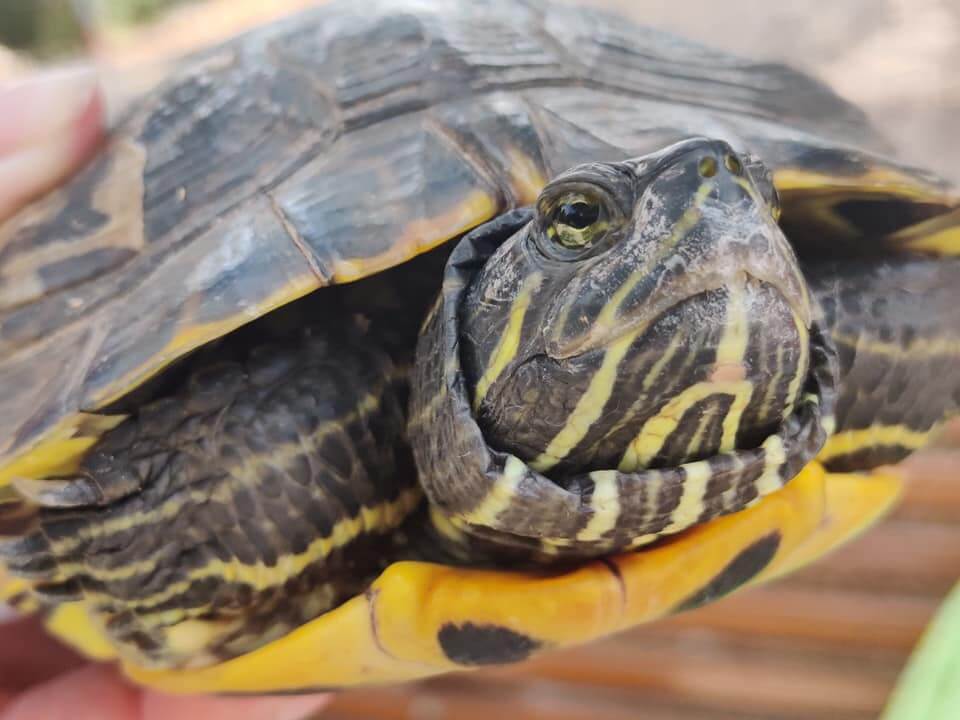
One of the many rescued turtles by Marine turtles rescue centre © Aquarium Pula
Croatia loves its animals
With vets displaying their expertise, locals on Korčula once again demonstrated their compassion and big heart when it comes to animals. And that compassion is not different from the general mood in Croatia.
With the nourishing of the recently deceased stork Malena being the most famous story of love between Croatians and animals, there were plenty of other examples too. From rejoicing every time whales or dolphins are spotted, when sheep visited the Zadar mall or when a Croatian reality TV star Jasmin Kunišinac raised a fox.
Unfortunately, Croatia also records cases of animal cruelty, such as the poisoning of cats and dogs, and each time Croatian public met it with a fierce backlash and anger for such acts.
Despite quite often arguing about everything imaginable and unimaginable, Croatians also express solidarity with each other when things get tough. For instance, many cities canceled their new year celebrations and relocated the money to Petrinja following its earthquake, as well as Croatian entrepreneurs too. But, many more instances of help were noted over the years.
Learn more about Korčula on our TC page.
For more about animals in Croatia, follow TCN's dedicated page.
Total Croatia in Ukrainian: Word of Support by Former Ukrainian Diplomat and Writer Jurij Lisenko
July 12, 2021 - As the Total Croatia site offers translations on all things Croatian in various languages, former diplomat and a famous Ukrainian writer Jurij Lisenko gave his opinion on the Ukrainian translations of the articles. Check out the video, acquired by Ivor Kruljac and edited by Jose Alfonso Cussianovich.
The tourist season is underway, and the goal is to get tourists from all over the world while providing safety in challenging times of corona – both for locals and visitors. As TCN reported, despite the tourist season in 2021 already being 58% better than that of 2020, it also seems that even with predicted Croatian tourism growth for this year, 2019 levels are very far.
With these predictions, Croatian tourists boards should do as much as possible in informing and promoting Croatia to have the best possible outcome. But given that doesn't always work out for the best, TCN is here to help.
Total Croatia: TCN's Multilingual brother
Well, more precisely, not TCN but rather TC or Total Croatia, if you will, the sister site that explains Croatia in detail. TC offers you in-depth articles to explain Croatia from head to toe: What you need to know about Croatia, how to come and travel around the country, detailed views on Croatian destinations, and info on everything you can see and do during your stay.
In addition, articles are translated to various European and world languages!
Word of support from an established Ukrainian writer
One of these languages is Ukrainian and in an effort to see how we did, we reached out to a Ukrainian writer Jurij Lisenko.
„Regarding the text itself, it is really well written. It contains very significant specific business information on various aspects, such as finding apartments or finding jobs for foreigners. At the same time, it is written lively, objective, bit ironic, but with great love for Croatia“, said Lisenko commenting on the Ukrainian translation for the article „Living In Croatia“.
Check out the video to see his verdict for yourselves.
Jurij Lisenko sends a special greeting to Total Croatia News and Total Croatia from Ukraine.
Famous Ukrainian writer helping Croatian writers
In a pool of quality Ukrainian writers, Jurij Lisenko is particularly interesting, not just for his excellent writing, but also as he was a former diplomatic advisor at Ukrainian Embassy in Zagreb.
As Akademija Art wrote, Jurij Lisenko was born on May 9, 1958 in Kyiv. Educated in Slavic languages, he lectured the Ukrainian language as well Serbian-Croatian in the Journalist faculty in Kyiv from 1980 to 1997. He also published over 20 scientific papers on philology and is a known poet publishing under the name of Jurko Pozajak. In 1998 he moved to diplomacy and worked for the Ukrainian Embassy in two terms (1998-2002 and 2013-2017), and also in Embassy in Belgrade, Serbia, from 2004 to 2008. He was also a speechwriter for Ukrainian president Viktor Juščenko and continued to work for Ukrainian's Ministry of Foreign Affairs since 2017.
Lisenko captured the attention of the Croatian public when along with his daughter Daria, he made new Croatian words, and the two co-authored a book of poetry for kids „Ide Svašta!“ (Everything coming).
As Večernji List reported back in 2016, their book was published back in 2002, and an expanded edition was printed in 2014.
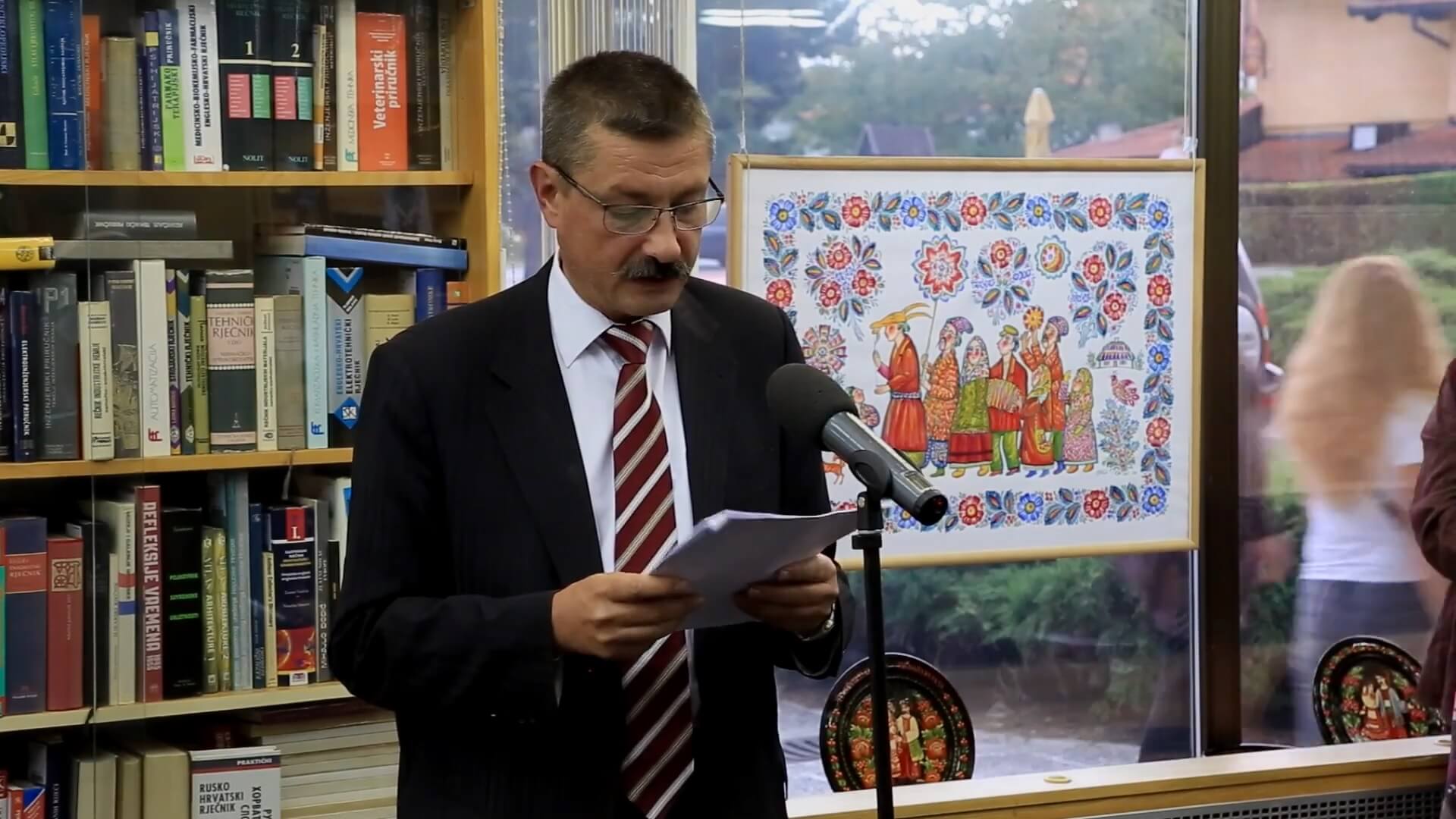
Jurij Lisenko reading his poetry at the exhibition opening of Ukrainian folklore "Petrikivski Rospis" in Samobor screenshot / Gradska knjižnica Samobor
Apart from that, the Lisenko family was very active and beloved on the Croatian poetry scene, and apart from presenting Ukrainian culture in Croatia, Jurij also introduced Croatian writers to Ukrainians.
The best instance of that is the Ukrainian translation of Croatian slam poet and writer Žarko Jovanovski and his short story collection „Tales of Lenin and Stalin“.
In addition, the good cooperation of the Ukrainian and Croatian writers is evident in an international literary magazine, Alternator, published by Sisak's Association For Alternative Culture, where Lisenko is a member of the editorial staff.
And the relevance of Lisenko as a partner for promoting Croatian writers in Ukraine was perhaps best described by the head of Edicije Božičević publishing house, Josip Ivanović.
„For a number of years, I knew a poet, diplomat, and genius Jurij Lisenko who I deeply respect. He is known in Ukraine more or less as an Avant Gard poet. And he published his book a long time ago. We walked around Lviv, and when there is a Lviv Book Fair, there are quite a lot of people and the atmosphere is as on a festival. Students approached him asking him to sign a book that he, as a poet, published 20 or 30 years ago. I never saw anything like that in Zagreb“, recalled Ivanović for Podcast Sekstant.
This shows not only that Ukrainians in general respect literature more than Croatians, but it is evident Lisenko is quite the rock star on the scene.
„I was very happy to see on Total Croatia a text on possibilities of foreigners in Croatia and that it was translated to 16 or 15 languages, including Ukrainian. I was very pleased with that. This means that connections between Ukraine and Croatia are significantly stronger. Indeed, in the last 10-15 years, Croatia became a favorite holiday spot for Ukrainians“, commented Lisenko.
Ukraine and Croatia – similar and friendly
With some differences between the Soviet Union and Yugoslavian communist practices, both Croatia and Ukraine share the same history of denied independence under a multi-national regime.
Đuro vidmarović, Croatian writer and former diplomat, told Laudato TV how the first Croatian president Franjo Tuđman appointed him as a Croatian Ambassador to Ukraine and how he was afraid as he wasn't sure what will await him there. But in the end, Ukraine for Vidmarović became a great topic and a happy period of his life. 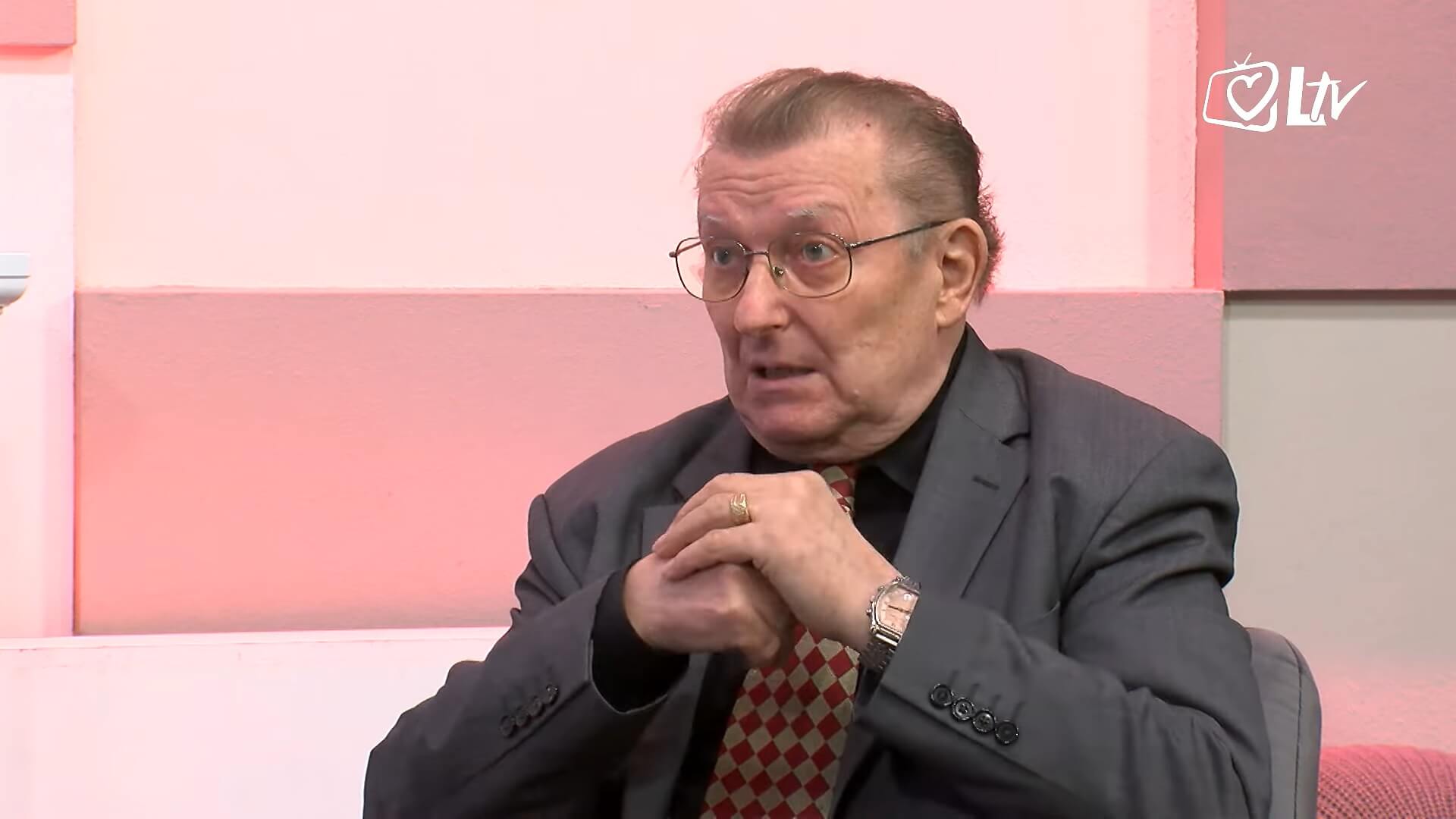
Former Croatian ambassador in Ukraine and writer Đuro Vidmarović, screenshot / LaudatoTV
„After I very quickly learned Ukrainian, a big area of Ukrainian culture and heritage opened up to me“, said Vidmarović adding that he met a lot of good colleagues there, particularly writers. As it was his mission to present Croatia, he also learned a lot and remained fascinated with the country of his mission.
„Ukraine is big, huge, contradictory, magical, unique, with a culture that makes it impossible for someone to stay indifferent. You come to Kyiv, and you see the Saint Sophia Cathedral from the 12th century with beautiful frescoes and architecture. My god, someone had to build it, had a sense for it. It was a civilization stronger from the majority of European countries at the time“, said Vidmarović for Laudato TV mesmerized with Ukraine he researches even to this day.
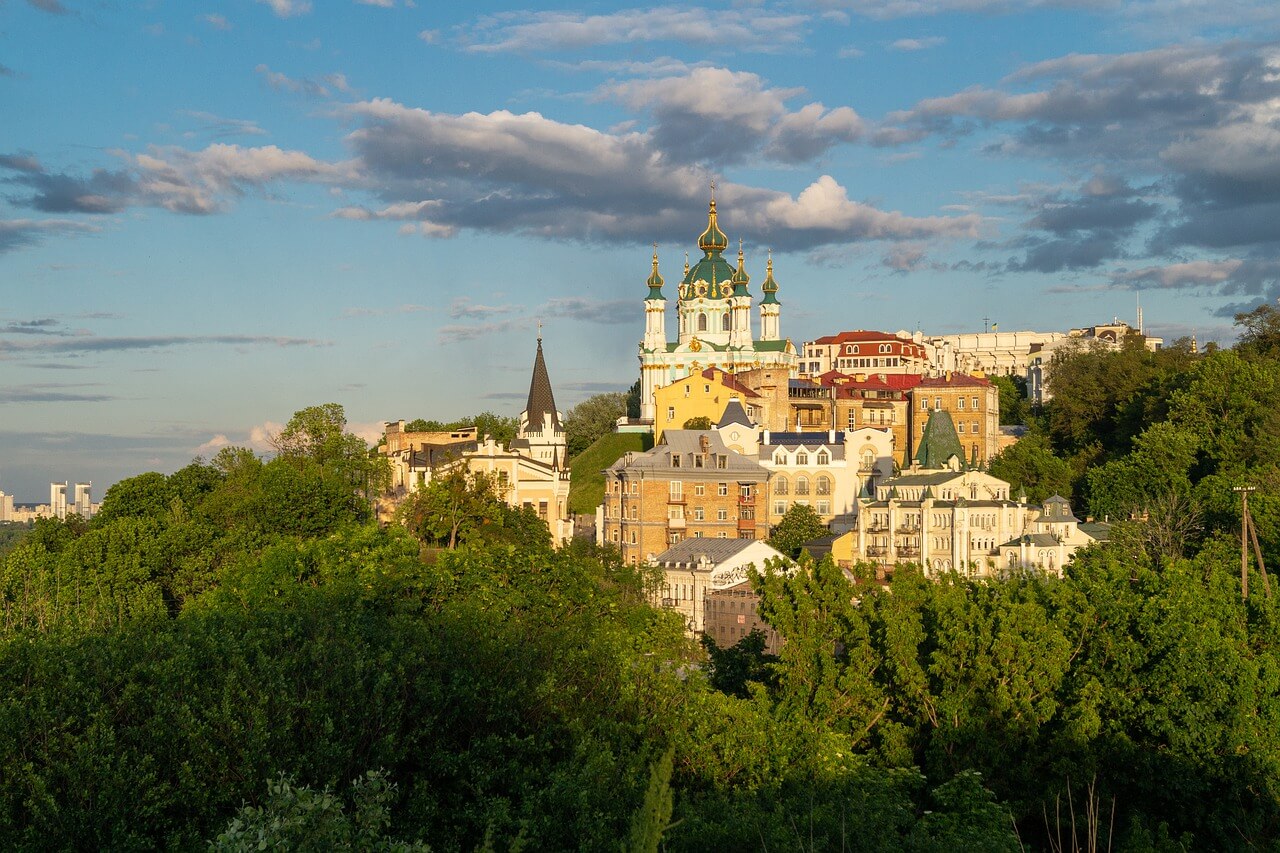
Breath-taking view of Kyiv © Pixabay
As Lisenko acknowledged, Croatia is also very famous in Ukraine too.
„Ukrainians discovered Croatia for themselves. Croatia is a beautiful country. You know that for yourselves. But, for Ukrainians, it is particularly pleasant in Croatia that they don't feel like strangers. But, for Ukrainians is a particular joy that languages are similar and Ukrainians, after several days, start to orient themselves in the language, to understand a bit, and can communicate with Croatians in cafes, restaurants, shops, streets, anywhere“, explained Lisenko for TCN.
He added that a lot of Ukrainians also come to Croatia searching for a job. While this may not be the best thing from the perspective of the Ukrainian economy (same as Croatians leaving Croatia isn't great for Croatian economic interests), Lisenko recognizes that the trend „also brings our two nations close“.
Discover Croatia in your native language
Apart from the article Lisenko commented on, Життя в Хорватії 2021: Витрати, дозволи, стиль життя та зустрічі з людьми, Ukrainians can also follow latest reports on COVID-19 in Croatia as well as 10 речей, які роблять Хорватію найкращою країною (or for English audience, 10 Things Croatia Does Better than Anywhere Else).
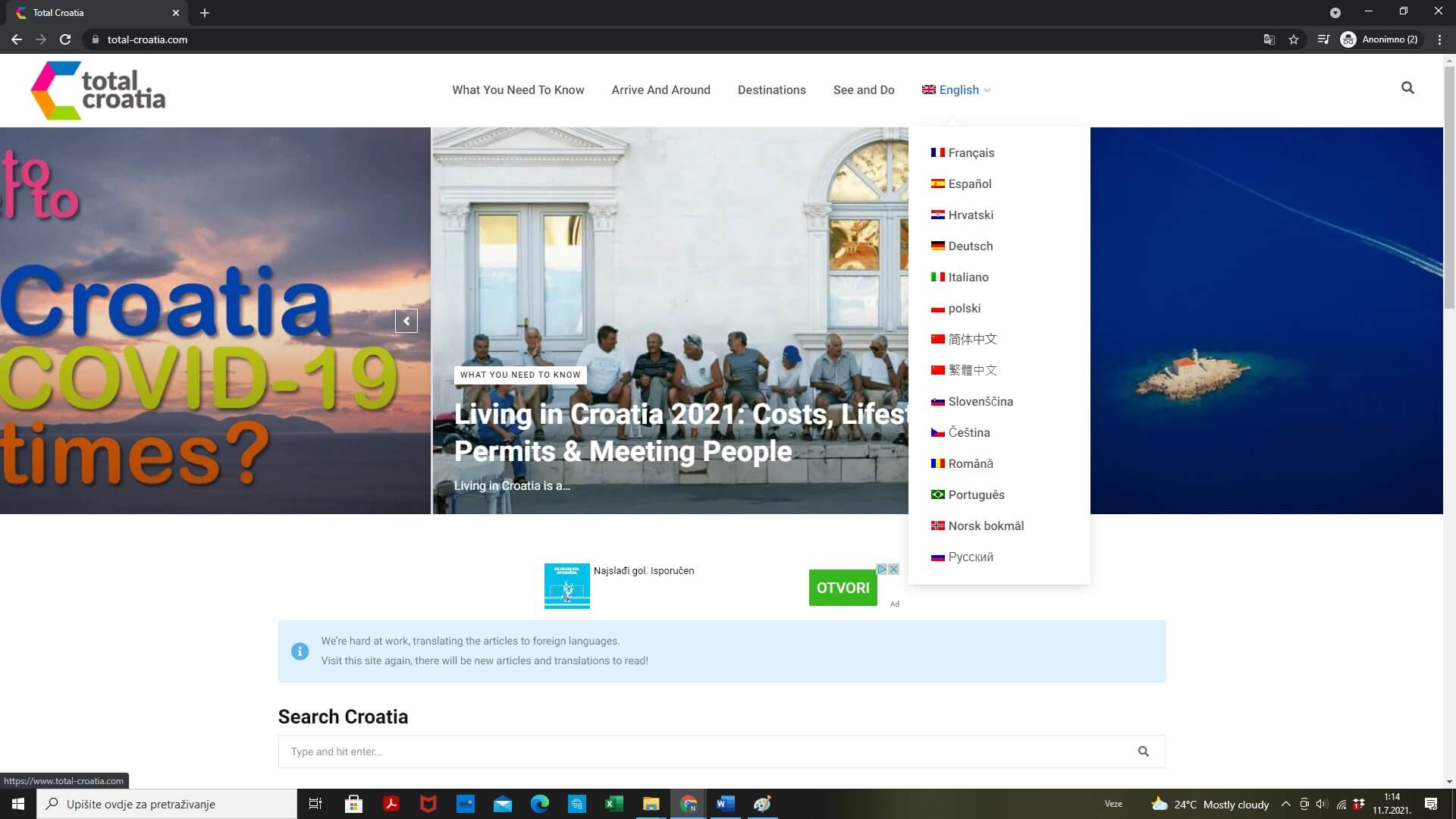
View of Total Croatia site and languages
So far, only these three articles are available in Ukrainian, but no doubt the future will bring more to make Croatia more accessible to beloved Ukrainian visitors.
Currently, TC counts 15 languages with the most translated content from English: Croatian, French, Spanish, German, Italian, Polish, Chinese (both traditional „zh-Hant“ and simplified "zh-Hans"), Slovenian, Czech, Romanian, Portuguese (Brazilian), Norwegian (Bokmål), and Russian.
If you want to learn more about diplomatic relations of Croatia, and everything regarding diplomacy and Croatia, check out TCN's series "Friends of Croatia" by Ivor Kruljac.
For more about Ukraine in Croatia, follow TCN's dedicated page.
Croatian Female Team Wins 3 Medals at EGOI: Amazing Results at First Female-Only European Informatics Olympics
June 22, 2021 - The celebratory atmosphere for the Croatian informatics scene, as the Croatian female team wins 3 medals at EGOI, the first edition of the European Female Olympiad in Informatics.
With Croatia meeting the first edition of the European Girls Olympiad in Informatics (EGOI) with a Female team ready to participate, a fantastic result was achieved as the four-member team won the contest with three medals.
As Srednja.hr reported, Ema Borevković, Lina Krištić and Lara Semeš (from Zagreb's XV Gymnasium), and Martina Licul (Pulau Gymnasium) represented Croatia and the aftermath of the contest that gathered 157 contestants saw Ema winning a gold medal, while Lara and Martina grabbed silver medals for their results.
„I think the girls did a great job, particularly when you take into consideration that Lara and Lina are first graders. For myself, I think there was space to collect more points, so I'm not entirely happy“, a new champion Ema told Srednja.hr. She added that she currently writes matura and hopes to study mathematics at the Faculty of Science at the University of Zagreb.
The contest was held online due to pandemic measures. The organization of the event for Croatian was arranged by the Croatian Computer Science Association (CCSA), and Zagreb's XV Gymnasium was the host, a place where pupils took the tests. Ivan Paljak, Paula Vidas, and Dominik Fistrić were professional guides (coaches) to the team, while Matej Ferenčević, Nikola Dmitrović, and Alenka Dogan Capan, lead by Krešimir Malnar, were in charge of the organization of the performance.
''The European Girls Olympiad in Informatics (EGOI) is a new international competition for young women interested in computer science, and it lasts for one week. The Olympiad comprises two contest days where the participants solve challenging algorithmic problems. The program is then rounded off with excursions. The students will have time to socialize with the other girls interested in the topic and to explore their host country. Each participating country may send a delegation consisting of four female participants under the age of 20, accompanied by two coaches,'' said the official website of the EGOI event.
This amazing result isn't the first time Croatian pupils triumphed in the field of informatics. Croatian pupils, such as Dorian Lendvaj and Patrik Pavić, who won gold medals at the International Romanian Master of Informatics, previously showed informatics is a much-loved subject in Croatia.
For more on tech, you can learn more about digital nomads in Croatia on our TC page.
For more about education in Croatia, follow TCN's dedicated page.
Ruđer Bošković Institute Chemist Team Makes Progress in Life Formation Research
June 10, 2021 - Do you ever wonder how life was formed? Always dedicated to scientific progress, the Ruđer Bošković Institute chemist team made progress in life formation research supporting the theory that the first molecules needed to develop life were formed on the surfaces of minerals in pre-historic times.
Science explores our present reality, but also the past. With many knowledge or credible theories on evolution, the very basic questions such as „how life came to form“, remain unclear. But why?
„Given that condensation (the process of water vapor turning back into liquid) of free amino acids is thermodynamically unfavoruable process in the water medium, it is a great mystery how it came to the formation of peptides before life on earth“, states the Ruđer Bošković Institute (IRB) press release.
It's worth noting that the thermodynamically unfavourabale process means the process is irreversible, which means it can't be reconstructed, and that's why scientists can see the formation of peptides, chains that connect amino acids that are crucial for life.
So, meet prebiotic chemistry – a study of chemistry dedicated to address and discover how organic compounds formed and self-organized for the origin of life, but so far without consensus.
But, progress is made once again thanks to the always active IRB. IRB's chemist team (José G. Hernández, dr Krunoslav Užarević, and Ph.D. student Tomislav Stolar,), in collaboration with colleagues from the pharmaceutical company Xellia (dr. sc. Ernest Meštrović, mag. chem. Saša Grubešić and dr. Nikolaom Cindro from the chemical department at the Faculty of Science (PMF), University of Zagreb), showed that with mechanochemical activation in a solid-state, the amino acids (organic compounds that combine to form proteins, with both being considered „the building blocks of life“) - such as glycine or alanine form peptides on mineral surfaces.
This supports the theory that life molecules could've been formed on Earth's mineral surfaces. The paper titled „Mechanochemical Prebiotic Peptide Bond Formation“, published in the prestigious Angewandte Chemie scientific journal published on behalf of the German Chemical Society presents these findings in greater detail.
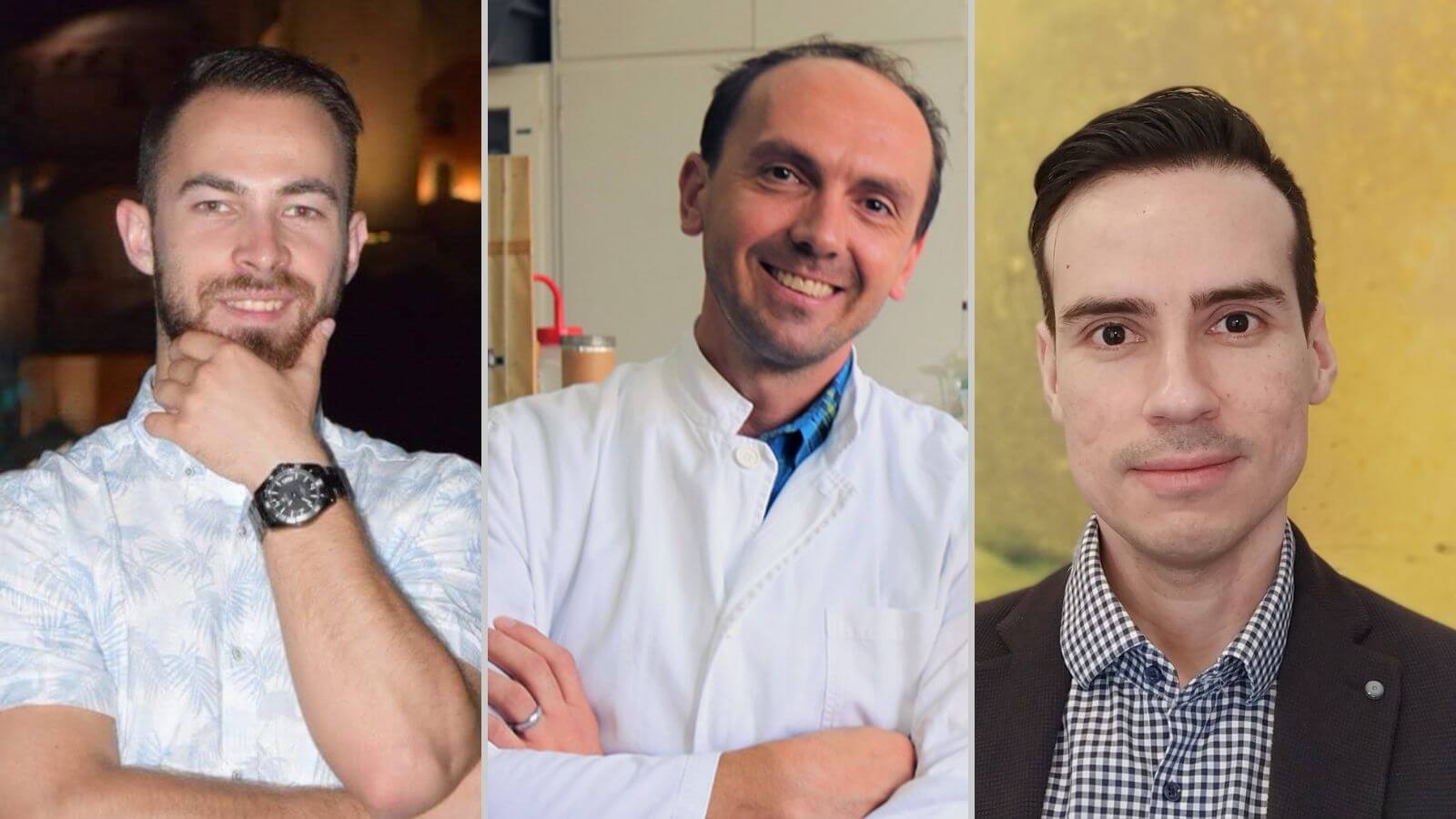
Stolar, Užarević and Hernandez © Ruđer Bošković Institute
„In this research, we showed that mechanochemical activation of free glycin ground with ball mill allows the new oligomers (molecules made of few similar or identical repeating units) by adding minerals that are basic components of earth surface and meteorites. With the identification of organic and inorganic molecules present in the Solar system, it's important in laboratory conditions to develop suitable processes that would explain the presence of these molecules. Such fundamental knowledge can then be applied in modern synthetical chemistry“, said a member of the IRB chemist team Tomislav Stolar. Stolar also participated in developing a new material known as CuZn-MOF-74 on which TCN previously wrote about.
The research was financed by the Croatian Science Foundation (HRZZ), and the next step is to apply this knowledge to synthesize new chemicals, which was one of the purposes of the research described by HRZZ.
IRB adds that the fact that various geological processes change the earth's surface, there is no historic evidence that could definitely answer how life on Earth was formed. It is believed that the first simple molecules triggered complex molecules to form in a process called chemical evolution and from that, life further continued to develop. Liquids, solid surfaces, or the phases between the two could've been potential conditions for these reactions, and mechanical energy sources were most likely found in meteor strikes, erosion, earthquakes, and more while thermal energy was most likely supplied by geothermal sources.
Learn more about Croatian inventions & discoveries: from Tesla to Rimac on our TC page.
For more about science in Croatia, follow TCN's dedicated page.
Cultural Identity of Vukovar: New Book Presented in Vukovar
June 9, 2021 - The fascinating question of the Cultural Identity of Vukovar is researched in a new book edited by Dr. Mateo Žanić and Petar Elez. However, as the editors stressed in the introduction, further research is needed to encompass all social groups in Vukovar and their contribution to the heritage of Vukovar.
After being published back in April this year, the book „Cultural Identity of Vukovar – Contribution to Investigating Heritage and Successors“, was presented this Wednesday in Vukovar. As Ivo Pilar Social Research Institute writes on its website the book was published in cooperation with the Vukovar State Archive, so it was only suitable that the first book presentation was held in Vukovar at the videoconference hall of College Of Applied Sciences „Lavoslav Ružička“ (named after a famous Croatian chemist whose work is awarded a Nobel Prize). In addition, the event marked International Archive Day.
The book was edited by Dr. Mateo Žanić and Petar Elez, and the presentation, alongside editors, saw scientific experts Dr. Dražen Živić, Mirela Hutinec, and Dr. Domagoj Tomas talks about the book.
„Fast events triggered by globalization process and information revolution which paradoxically lead to today's societies being fiercely occupied with the meaning of past, and preserving its valuable traces. In that context, there is a spreading interest for heritage that holds an important component to understand the relationship between the past and present“, says the editorial introduction of the book.
The editors went on to explain how „the city proved to be futile to interpret the meaning of heritage and its contribution to cultural identity,“ and the editors wanted to present various aspects of Vukovar's cultural heritage.
Apart from editors Žanić (who wrote a chapter „Layers of memories and material heritage in modern-day Vukovar) and Elez (author of the chapter „State archive in Vukovar and development of archive service in Vukovar-Srijem County“), the book features eight more authors. Ivan Rogić (Whose Heritage? Who is the successor?), Dražen Živić (on Vukovar's feudalists), Vlasta Novinc („Danube, food, Corso“), Dragana Drašković (on the cultural life of Borovo Selo), and more by Dragan Damjanović, Toni Roca, Ivana Bendra and Ivan Hubalek.
With these broad presentations of culture and heritage in Vukovar, editors hope this book will encourage further research as they are aware this is certainly not the final word on these interesting questions and issues.
„As editors, we are aware that the book does not deal with topics that concern different social groups that left their trace in Vukovar end enrich the history of the city. We hope that future editions that will deal with this topic expand the reach of issues and help us to realize better what do we inherit from the past and why is that important“, concludes the introduction of the book.
So far, the book is available only in Croatian, and research that will, as editors say, deal with other social groups in Vukovar is yet to come. Keeping in mind the terrible aftermaths of the war in Vukovar in the 90s and inter-ethnic tensions, further findings on joint cultural contribution to Vukovar may indeed be the enlightenment needed for peaceful cohabitation and development of Vukovar as a perspective city in Croatia.
Speaking of heritage, learn more about UNESCO recognized heritage in Croatia on our TC page.
For more about science in Croatia, follow TCN's dedicated page.
ConTEL 2021: Scientific Conference on All Things Telecom in Zagreb
June 8, 2021 - From June 30 to July 2, the exciting field of information and communication technology will be at ConTEL 2021 conference in Zagreb.
With information and communication technology steadily growing, new challenges, questions and issues are opening up – both for the industry and academic community. Both industry and academia will get the chance to address the latest issues and questions at the 16th edition of the international telecommunication conference ConTEL 2021, which will take place from June 30 to July 2 in Zagreb.
As the Faculty of Electrical Engineering and Computing (FER) at the University of Zagreb reported on its website, the goal of the conference is to encompass current and upcoming network technologies that allow omnipresent internet and communications as key starters of the connected information society.
„With new services and access networks grows the need to enhance network infrastructure - not just in terms of quality and performances, but also in terms of scalability (upgrading), mobility, energetic sufficiency, and technology integration. The Conference program will introduce the newest achievements in selected fields, through regular and specific thematic meetings and workshops“, states FER.
To ensure the quality of the conference, researchers, and scientists in this respective field, researchers and scientists were invited to submit their papers of work by March 21. The paper went under two double anonymous reviews to ensure an unbiased assessment of its importance and contribution to the conference. The selected papers will be readable on the IEEE Xplore website, and the IEEE (Institute of Electrical and Electronics Engineers) is one of the key sponsors of the conference.
„IEEE and its members inspire a global community to innovate for a better tomorrow through its more than 396,000 members in over 160 countries and its highly cited publications, conferences, technology standards, and professional and educational activities. IEEE is the trusted 'voice' for engineering, computing, and technology information around the globe“, says IEEE, „the world’s largest technical professional organization dedicated to advancing technology for the benefit of humanity“ on its website.
„The format of the event will take into account the COVID-19 situation and travel restrictions. Our wish and goal is to have a live or hybrid event, with virtual participation as necessary. Stay safe and healthy, and we hope to see you in Zagreb!“, states the ConTel official website.
Learn more about Croatian inventions & discoveries: from Tesla to Rimac on our TC page.
For more about science in Croatia, follow TCN's dedicated page.
Croatian Mathematical Society (HMD) Has a New President, Dr. Vesna Županović
May 20, 2021 - Earlier in May, the Croatian Mathematical Society (HMD) elected a new president, Dr. Vesna Županović.
As Vedran Pavlić wrote for TCN back in 2016, Croatian students were then better in math than in 2011. Fantastic results were also accomplished in 2018 when Croatian students scored medals at the mathematical olympiad. Good results didn't go amiss in 2020, and initiatives for promoting science (such as the one of the Local History Museum in the central town of Ogulin that introduced kindergarten kids with quantum physics), appear all over the country.
Scientists do have their own professional associations, representing them and with more engaging, less engaging, with bigger, or smaller success, work on the promotion of their respective fields. Mathematicians are no exception, and it's worth noting that the Croatian Mathematical Society (HMD) recently has a new president, Dr. Vesna Županović. Faculty of Electrical Engineering and Computing (FER) at the University of Zagreb reported on its website, an online assembly of HMD voted that Županović be the new president on May 14, replacing dr. Hrvoje Kraljević was the president for the past 14 years.
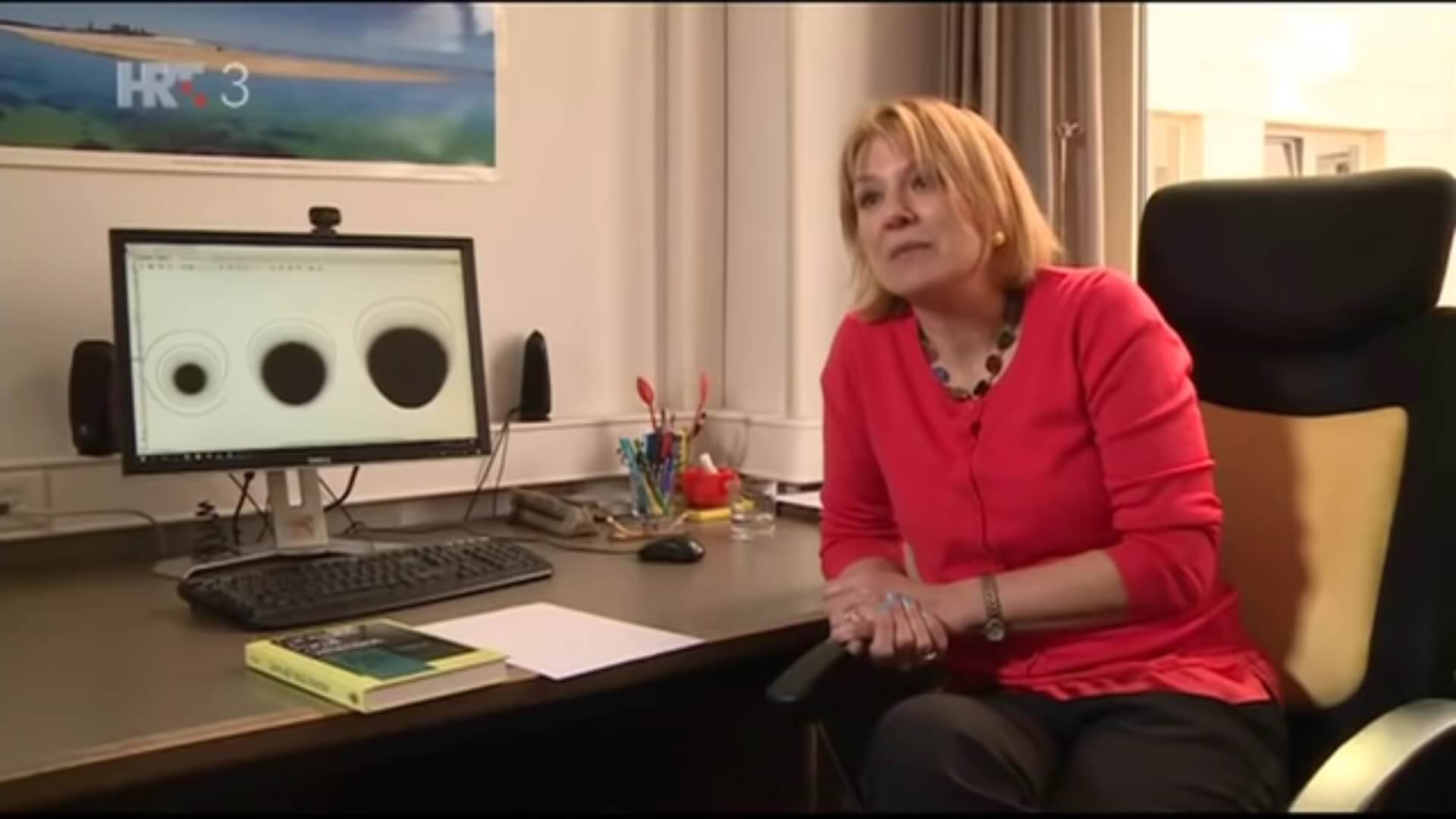
Vesna Županović, screenshot / Treći element
Apart from her new function, Županović is the professor at FER's department for applied mathematics.
Being the faculty that expects excellent mathematical knowledge, FER is quite happy with this decision of HMD, and they also explained the importance of the aforementioned society.
„HMD goal is to enhance and promote mathematical sciences, math education on all levels, math applying in other fields, as well as enhancing the social status of mathematicians in general“, said FER on their website while congratulating. Županović on being elected.
They added that HMD has five departments: education, scientific, engineering, professional, and student department, along with a youth section that gathers pupils on lower levels of the education system. Publishing scientific and professional magazines and books on math is in the domain of the organization too.
Before being president, Dr. Županović was the Head of the Engineering department on HMD. Born in Split in 1965, she graduated from Mathematical Gymnasium in Split and went on to Zagreb to study math at the Faculty of Science (PMF), University of Zagreb. Her competence in math includes Nonlinear equations, Bifurcation, Fractals, Limit-cycles, Nonlinear dynamical systems, and Spirals.
Croatian Mathematical Society stated on its website that they are organizing conferences, math competitions, participation in math Olympics and other international contests, summer schools, and more.
In 1994, HMD also started a Mathematical Foundation For Science with a goal to award young scientists for their contribution. The receiver of the award can't be more than 35 years old, and concluding with 2015; five awards have been given in total since the first award in 1996.
Learn more about Croatian inventions & discoveries: from Tesla to Rimac on our TC page.
For more about science in Croatia, follow TCN's dedicated page.
"Sa(n)jam Knjige u Istri" Book Fair to be Held in Pula on 4-13 June
ZAGREB, 16 May, 2021 - The 26th "Sa(n)jam knjige u Istri" book fair will take place in Pula, Istria County on 4-13 June under the slogan "Where are we?", organisers announced earlier this week.
This year's edition will overflow with poetry and music, organisers said, thanks to 15 poets led by Petar Gudelj who will appear before the public accompanied by musicians led by jazz trumpeter Branko Sterpin.
The fair will feature the traditional "Breakfast with the author" programme and a new one, called "The new faces of Pula".
Participating in the fair for the first time are writers Svetislav Basara, Želimir Periš, Ivana Bodrožić, Magdalena Blažević, Tanja Stupar-Trifunović, Ena Katarina Haller and Ivica Đikić.
Another novelty will see Zagreb Croatian National Theatre actors reciting the verses of contemporary Croatian women poets.
For more news about lifestyle in Croatia, click TCN's dedicated page.
For more news about Croatia, CLICK HERE.
European Archaeology Days (EAD) at Archaeological Museum Zagreb from June 18-20
May 14, 2021 -The European Archaeology Days (EAD) at the Archaeological Museum Zagreb, held on June 18-20 and organised by the French Culture Ministry, and the French National Institute for Preventive Archaeological Research (INRAP), brings all things archaeological to the Croatian capital.
The heavy blow of the 2020 Zagreb earthquake affected the Archaeological Museum Zagreb, as did the one back in 1880. However, as the Museum continued to stand the test of time past the 19th-century tragedy, it's great to see that it resisted last year's troubles as well. Not only is it open, but it will also host European Archaeology Days (EAD) for 2021 from June 18-20.
As the Museum's official website informs its readers, the goal of the manifestation is to popularise and present archaeology as a science, and the rich programme will include workshops, lectures, exhibitions, presentations of publications and projects, as well as expert guides, virtual content, and many other types of activities.
Archaeological departments of the highest educational institutions from Zagreb, Pula, Zadar as well as the Croatian Archaeological Society, the Croatian Archaeological Institute, Institute for underwater archaeology in Zadar, Kaptol county, and museums from Zadar, Sisak, Vinkovci, and Rijeka that are dedicated to the field of archaeology and history, are all partners of the event.
The organisers of this spectacle for anyone curious about mankind's past are the Culture Ministry of the French Republic and the French National Institute for Preventive Archaeological Research (INRAP).
As a non-profit Organisation on Archaeological Open-Air Museums, Experimental Archaeology, Ancient Technology and Interpretation, EXARC reports on its website that EAD was established in France back in 2008 and coordinated by INRAP (The National Institute for Preventive Archaeological Research), as a national event, but in 2019, the manifestation of this event opened up on a larger, European scale. Today, the EAD aspires to become a European concept that benefits the general public, museums, and culture.
Young as an international manifestation, it managed to be organised in 2020, but of course, under specific circumstances and with respect to all of the epidemiological measures. It was different but successful thanks to the 1,000 initiatives and 28 European countries taking part last year, all of them adapting to the virtual activities over physical ones.
''The EAD is a long weekend dedicated to archaeology in all its forms. We raise awareness and familiarise European audiences with all aspects of archaeology. A variety of events will be organised, aiming at engaging families, schools, students, history enthusiasts, museum visitors, as well as merely curious participants to discover this multifaceted discipline and their archaeological heritage.
Despite the challenging times that Europe is going through on several levels, there are still things that bring us together. Looking for common ground, for cohesion and reciprocity, while all countries continue to preserve their cultural identity and diversity, European Archaeology Days aim at sharing archaeological heritage throughout Europe and make culture accessible to all“ elaborated Exarc, on its website. They add that INRAP welcomes everybody wanting to take part in the manifestation to join and further enrich the programme.
It might be worth nothing what the difference between history and archaeology actually is. History focuses on written sources, while archaeology focuses on physical ones, such as items, but they both explore the past. For those wanting to learn more about how we as humankind progressed to the stage where we are at today, they can find joy in informing themselves about these respective fields.
Speaking of the old, the historical, and of course the physical, there are very many interesting sites across Croatia protected by UNESCO. Learn more on our TC page.
For more about science in Croatia, follow TCN's dedicated page.


